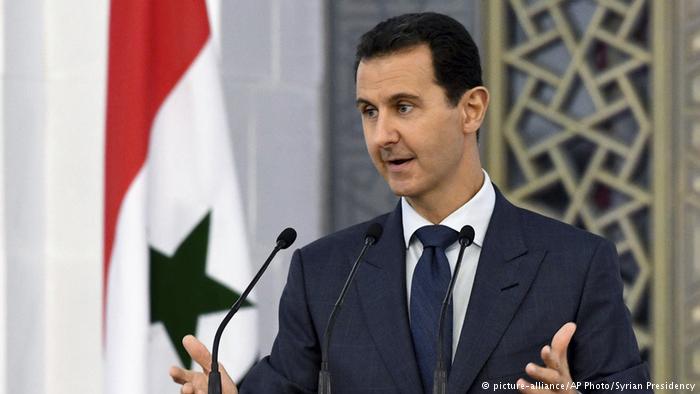LATEST
Syria’s leader Bashar al-Assad has said that, while he has blocked Western designs to topple him, the war against rebels is ongoing.
In a televised speech to Foreign Ministry officials, Assad said:
Talking about foiling the Western project in the region doesn’t mean we are victorious…they have failed, but the battle is still going on. They have failed until this moment, and we haven’t won until this moment. The signs of victory are there, but signs are something and victory itself is another thing.
Assad’s message — I’m winning, but I haven’t won — pointed to some tension over his political situation, even as he and his supporters have come through the rebel challenge to take control of more territory in Syria.
On the one hand, the Syrian leader effectively paid tribute to Russia, Iran, and Hezbollah for keeping him in power after he and his military were on the verge of defeat in 2015: “Their direct support – politically, economically and militarily – has made possible advances on the battlefield and reduced the losses and burdens of war.”
On the other, behind the lengthy denunciations of the “West”, Assad seemed to be facing unwelcome maneuvers by his allies, notably Moscow.
He said he welcomed Russian “de-escalation zones”, invoking “national reconciliations that proved their effectiveness” — the regime’s label for the capitulation of opposition areas. But at the same time, he pointed to military offensives despite the zones: “We will continue in the upcoming stage to crush terrorists everywhere in cooperation with friends.”
The Russian zones, supported in one case by the US and in others by Iran and Turkey, would allow the opposition to remain in control of much of northwest Syria, including almost all of Idlib Province, and parts of the south. At the same, Kurdish-led political and military forces are establishing a de facto autonomy across north and northeast Syria with their victories against the Islamic State.
The Assad regime has been unhappy about the concession of territory to either the opposition or the Kurds, and Assad again rejected a federal Syria on Sunday: “The unity of Syrian territory is self-evident and not up for debate or discussion.”
Assad also tipped off the challenge of the economic situation after 78 months of conflict, the destruction of much of Syria’s infrastructure, and the displacement of more than half of the 22 million population, as he spoke of the goal of “increasing communication with the outside and marketing economic opportunities”.
Syrian GDP has fallen by more than 75% since the start of the uprising and the regime is now largely dependent on outside aid from countries such as Russia and Iran, a reliance acknowledged by Assad in the thanks to his “friends”.
Report: 6 People Killed in Mortar Attack on Damascus International Fair
A mortar attack struck the Damascus International Fair on Sunday, reportedly killing at least six people and injuring 10.
The blast was said to have happened at the main gate of the fair. A BBC reporter at the event, Lyse Doucet, confirmed the attack, but it has not been mentioned by Syrian State media.
The Fair is a major PR as well as economic event for the Assad regime, which is promoting it as a sign of a recovering Syria. It has not been held since summer 2011.
More than 45 countries have sent businessmen and officials to the Fair.
US Agrees “Deconfliction Line” with Assad Regime and Russia in Northeast Syria
In a further sign of accommodation with the Assad regime, the US has agreed to a “deconfliction line” in northeastern Syria with Russia and pro-Assad forces.
Pentagon spokesman Eric Pahon said the line “runs in an irregular arc” from a point southwest of Tabqa, taken by the Kurdish-led Syrian Democratic Forces from ISIS this spring, along the Euphrates River towards — but not including — the city of Deir ez-Zor, divided between the Islamic State and pro-Assad groups.
“The purpose of the line is to de-conflict and enable counter-Da’esh [ISIS] operations by all parties,” Pahon said.
Pro-Assad forces have been advancing towards Deir ez-Zor Province, the last redoubt of ISIS forces, as they slowly gained ground in the past month against the Islamic State. The advance raises the prospect of a scramble for territory between the pro-Assad units and the US-supported, Kurdish-led SDF, as well as possible conflict between the regime and its allies with the Free Syrian Army.
In May, the US carried out three airstrikes against pro-Assad units, including Hezbollah and Iranian-led Iraqi militia, trying to establish positions within a 55-km (34-mile) exclusion zone around the Free Syrian Army base — which includes US special forces — at Tanf, in eastern Syria near the Iraqi and Jordanian borders.

